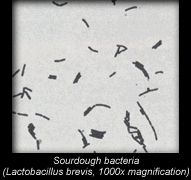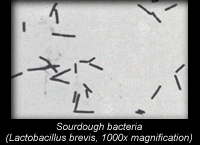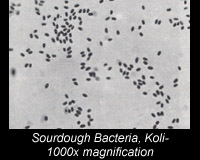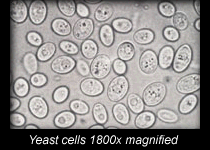
Analyzing our historical past reveals some interesting facts on our eating habits. We all understand that we are not the typical hunter or gatherer that commonly existed in prehistoric times. But after all, we still rely on food for our nourishment, and welfare. Our digestive system has also evolved over time, but there are fundamental rules we have to abide by, even in our modern days.

Once we expelled our nomadic nature, we began to settle down. This initiated the foundations of civilization, also known as our ancient history.

 Systematic agricultural practices started to develop. Crops were planted, and animals were domesticated. Milk and grain products became staples in our diets. Out of these foods were many fermented foods created. Some examples are yogurt, kefir, wine, beer, sauerkraut, miso, soy sauce, cheese, breads, and many forms of grain and seed based porridges. Natural fermentation processes, based on an active bacterial culture, created all of these foods. It seemed that every culture relied predominantly on one kind of fermented food or another. Bread became one of the most widespread food staples because of its inherent nature: it could easily be transported, could keep for an extended period of time (under the right conditions), the ingredients were easily obtainable, especially after systematic agricultural practices were established. This is why bread is called "the staff of life". It was, and still is one of the most important essential foods today. The main difference is that most of our ancestors ate sourdough bread, as opposed to the synthetic kind of today. Systematic agricultural practices started to develop. Crops were planted, and animals were domesticated. Milk and grain products became staples in our diets. Out of these foods were many fermented foods created. Some examples are yogurt, kefir, wine, beer, sauerkraut, miso, soy sauce, cheese, breads, and many forms of grain and seed based porridges. Natural fermentation processes, based on an active bacterial culture, created all of these foods. It seemed that every culture relied predominantly on one kind of fermented food or another. Bread became one of the most widespread food staples because of its inherent nature: it could easily be transported, could keep for an extended period of time (under the right conditions), the ingredients were easily obtainable, especially after systematic agricultural practices were established. This is why bread is called "the staff of life". It was, and still is one of the most important essential foods today. The main difference is that most of our ancestors ate sourdough bread, as opposed to the synthetic kind of today.

 All of these leavened breads had, as an active ingredient, a bacterial yeast culture. This allowed the bread to be baked properly and sufficiently digestible. These bacterial cultures are present at all times and only need to be multiplied under the right circumstances to aid us in producing sourdough bread. We have excluded these microscopic bacterial cultures and rely only on yeast to leaven the breads of modern times. Our digestive system heavily relies upon fermented foods; therefore, removing these from our diets has a detrimental effect on our well-being. The properties and bacteria found in our digestive system are very similar to the ones found in a natural sourdough culture. The microscopic world is still one of the most unexplored to date. It is a world mostly unseen for the majority of us; this explains why we are mostly unaware of it, and don't consciously perceive it's presence. But the numbers are staggering. In one gram of soil there are anywhere form 1 to 10 million bacteria. The size of the bacteria is approximately 1 micron (one millimeter has 1000 microns). Coupled with a reproduction factor of 20 minutes on average, things multiply in an astronomical way within a short time period. All of these leavened breads had, as an active ingredient, a bacterial yeast culture. This allowed the bread to be baked properly and sufficiently digestible. These bacterial cultures are present at all times and only need to be multiplied under the right circumstances to aid us in producing sourdough bread. We have excluded these microscopic bacterial cultures and rely only on yeast to leaven the breads of modern times. Our digestive system heavily relies upon fermented foods; therefore, removing these from our diets has a detrimental effect on our well-being. The properties and bacteria found in our digestive system are very similar to the ones found in a natural sourdough culture. The microscopic world is still one of the most unexplored to date. It is a world mostly unseen for the majority of us; this explains why we are mostly unaware of it, and don't consciously perceive it's presence. But the numbers are staggering. In one gram of soil there are anywhere form 1 to 10 million bacteria. The size of the bacteria is approximately 1 micron (one millimeter has 1000 microns). Coupled with a reproduction factor of 20 minutes on average, things multiply in an astronomical way within a short time period.

 Without bacteria, life on this planet as we know it just wouldn't exist. Bacteria were the first living organisms on earth, and date back to 3.5-4 billion years ago. They have adapted to some of the most extreme environments on this planet. They live in the deepest of oceans, and on the highest mountains. The things that they are capable of digesting range from all extremes, consuming even hydrogen sulfides, which are compounds profoundly toxic to us. The radiation that would result from a nuclear bomb exploding wouldn't even tickle some of these bacteria - no joke intended. Some bacteria can survive a thousand times over the radiation that we are able to, even with the technologies we possess today. This only shows how diverse bacteria really are. There are new species discovered on a daily basis and as it seems there is no end in sight in the foreseeable future, sort of the tip of the iceberg. Without bacteria, life on this planet as we know it just wouldn't exist. Bacteria were the first living organisms on earth, and date back to 3.5-4 billion years ago. They have adapted to some of the most extreme environments on this planet. They live in the deepest of oceans, and on the highest mountains. The things that they are capable of digesting range from all extremes, consuming even hydrogen sulfides, which are compounds profoundly toxic to us. The radiation that would result from a nuclear bomb exploding wouldn't even tickle some of these bacteria - no joke intended. Some bacteria can survive a thousand times over the radiation that we are able to, even with the technologies we possess today. This only shows how diverse bacteria really are. There are new species discovered on a daily basis and as it seems there is no end in sight in the foreseeable future, sort of the tip of the iceberg.

 There is also a very small portion of disease causing bacteria. The beneficial bacteria and the disease causing bacteria do not thrive in the same PH (acidic or alkali) environments. Beneficial bacteria that produce lactic acids are key organic acids keeping our intestinal health in order, and in the right PH levels to discourage the growth of bad bacteria. Colon cancer has been directly linked to over acidic conditions favoring these bad bacteria, and that is why it is so important to practice good housekeeping is necessary. There is such a thing as crowding out, its like a tent full of people, when it is full it is full, just make sure you don't have a stinker in your midst. The proper term to use when referring to beneficial bacteria is 'probiotic'. There is also a very small portion of disease causing bacteria. The beneficial bacteria and the disease causing bacteria do not thrive in the same PH (acidic or alkali) environments. Beneficial bacteria that produce lactic acids are key organic acids keeping our intestinal health in order, and in the right PH levels to discourage the growth of bad bacteria. Colon cancer has been directly linked to over acidic conditions favoring these bad bacteria, and that is why it is so important to practice good housekeeping is necessary. There is such a thing as crowding out, its like a tent full of people, when it is full it is full, just make sure you don't have a stinker in your midst. The proper term to use when referring to beneficial bacteria is 'probiotic'.

One theory is that aging is directly related to one organ in our body, and that is the pancreas, located on the back wall of our stomach. It produces enzymes, which digests our food. As this organ proceeds to get older, our bodies reflect the same aging. If overstress by foods especially high sugar occurs, we age faster because this organ gets exhausted. Diabetes is the first result of its uncontrolled aging. There are two types of diabetes, and the most common, age related, is what most of us are informed of, but even kids can get diabetes. Not being able to digest properly is the onset of aging so keeping it in good health will most likely help keep wrinkles at bay.
Thank you for your time and patience.
|
